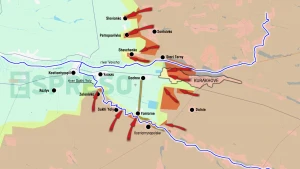
NATO countries may send troops to Ukraine if Kyiv does not receive tangible security guarantees in Vilnius - former alliance chief
Former NATO Secretary General Anders Rasmussen said that a group of NATO countries may decide to send troops to Ukraine if the alliance, including the United States, does not provide Kyiv with tangible security guarantees at the upcoming summit in Vilnius.
The Guardian writes about it.
According to the article, Rasmussen said that if NATO cannot agree on a clear path for Ukraine, there is a possibility that some countries can take action individually. For example, Poland, which has been very active in providing concrete assistance to Ukraine. It could be followed by the Baltic states. Sending troops on the ground is also possible.
“I think the Poles would seriously consider going in and assemble a coalition of the willing if Ukraine doesn’t get anything in Vilnius. We shouldn’t underestimate the Polish feelings, the Poles feel that for too long western Europe did not listen to their warnings against the true Russian mentality,” he said, adding that Ukraine would legally seek such military assistance.
The former NATO chief emphasized that Ukraine needs written security guarantees even before the summit but outside the NATO framework. This includes intelligence sharing, joint exercises with Ukraine, increased production of ammunition, NATO interoperability, and the supply of weapons sufficient to deter Russia from further attack.
But Rasmussen warned that security guarantees would not be enough but some NATO allies may favor security guarantees in order to avoid a real discussion about Ukraine's membership aspirations.
“I don’t think that is possible. I think the NATO issue will be raised at the summit in Vilnius. I’ve spoken with several eastern European leaders, and there is a group of hardcore, eastern central European allies that want at least a clear path for Ukraine towards Nato membership,” Rasmussen says.
The former NATO chief emphasizes that history has shown how dangerous it is to leave Ukraine in the alliance’s waiting room indefinitely. Even if the Vilnius summit fails to extend an invitation to NATO membership, the possibility of extending such an invitation in Washington next year could be invoked. This path to membership should exclude the introduction of preconditions, such as a NATO Membership Action Plan, which was not required of either Sweden or Finland.
“Anything less than that would be a disappointment to Ukraine,” he said.
He also rejected the argument that Ukraine could not be offered a path to NATO membership until the war was over because this would provide Putin with a veto.
Ukraine's response
Ukrainian Foreign Minister Dmytro Kuleba said that the Ukrainian Armed Forces can handle the aggressor on their own, they only need Western weapons.
"Until the armed conflict on the territory of Ukraine is over, foreign countries will not deploy their troops to our country. Moreover, we do not ask for such intervention - we say: give us weapons, we can do the fighting ourselves," the diplomat said on the 1+1 channel.
Ukraine's path to NATO after Russia's full-scale invasion
On September 30, 2022, Ukraine’s President Volodymyr Zelenskyy, Speaker of the Verkhovna Rada Ruslan Stefanchuk, and Prime Minister Denys Shmyhal signed an application for accelerated NATO membership amid Russia's annexation of the occupied territories. The decision to submit the application followed a meeting between the Supreme Commander-in-Chief's Staff and the National Security and Defense Council.
Before Ukraine joined NATO, Zelenskyy called on Western partners to implement the security guarantees outlined by Ukraine in the Kyiv Security Treaty.
On October 2, 2022, the presidents of the Czech Republic, Estonia, Latvia, Lithuania, North Macedonia, Montenegro, Poland, Slovakia, and Romania called on the allies to increase military assistance to Ukraine and supported its membership in NATO. On October 3, Lithuania called for the start of negotiations on Ukraine's accession to NATO. Since then, many countries have adopted documents in support of Ukraine's accession to the Alliance. For example, on May 11, 2023, the Polish Senate voted in favor of a resolution on Ukraine's NATO membership and noted that the same procedures should be applied to Ukraine as to Sweden and Finland. On May 31, the Czech Senate supported Ukraine's early accession to NATO. On June 3, Canada and Poland issued a joint statement supporting Ukraine on this path.
The NATO summit is scheduled to take place in Vilnius in July. During the summit, Ukraine anticipates tangible decisions regarding its journey toward joining the Alliance. On May 23, Ukraine's ambassador to NATO, Natalia Halibarenko, announced that in light of the upcoming NATO summit in Vilnius, Ukraine is developing two cooperation packages — a political one and a practical one — that it intends to present for discussion.
On May 30, Ukraine’s Foreign Minister Dmytro Kuleba announced "three steps to make Vilnius summit a success,” namely "Strengthen Ukraine-NATO institutional ties and assistance. Take a step toward UA membership. Provide security guarantees on Ukraine’s path to NATO."
- News












































